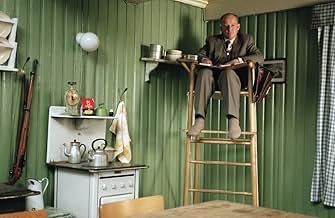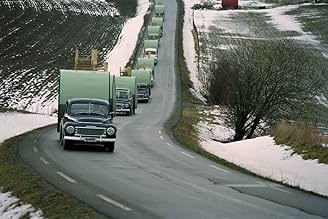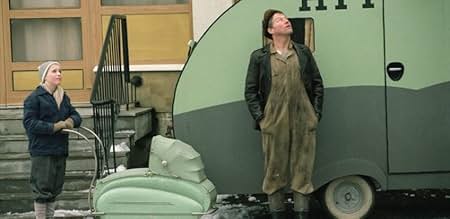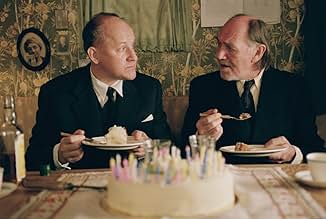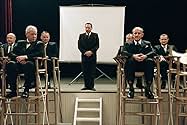AVALIAÇÃO DA IMDb
7,3/10
8,8 mil
SUA AVALIAÇÃO
Adicionar um enredo no seu idiomaA scientific observer's job of observing an old cantankerous single man's kitchen habits is complicated by his growing friendship with him.A scientific observer's job of observing an old cantankerous single man's kitchen habits is complicated by his growing friendship with him.A scientific observer's job of observing an old cantankerous single man's kitchen habits is complicated by his growing friendship with him.
- Direção
- Roteiristas
- Artistas
- Prêmios
- 8 vitórias e 7 indicações no total
Gard B. Eidsvold
- Bakkerman
- (as Gard Eidsvold)
- Direção
- Roteiristas
- Elenco e equipe completos
- Produção, bilheteria e muito mais no IMDbPro
Avaliações em destaque
When I picked up this DVD, I noticed two prominent words on the front--"Hilarious" and "Funny". After seeing the film, I think these are both completely inappropriate descriptions of the film. So, of course, some advertising idiots decided to promote this as a hilarious comedy, even though this did not appear to be the intention of those who made the movie! There are a few mildly funny moments, but it just isn't a comedy. Instead, it's a slight slice of life film about a Swedish company that prides itself on scientifically investigating EVERYTHING there is about kitchens. The story centers on one of their studies which is done with Norwegian bachelors. They decided to send observers into these kitchens and passively watch and record the movement patterns of these men. The observers and observed are under strict orders NOT to interact in any way.
This story centers on one home. At first, the bachelor doesn't want to even allow the observer in the home. Then, once he begrudgingly lets him in, their relationship is pretty tense. However, over time it is natural that a bond is created between them. The acting is good and the story generally pretty compelling. Not a bad little unusual film, but for some reason the writers decided to end the movie on a down note--I can understand the choice, but don't agree with it at all.
This story centers on one home. At first, the bachelor doesn't want to even allow the observer in the home. Then, once he begrudgingly lets him in, their relationship is pretty tense. However, over time it is natural that a bond is created between them. The acting is good and the story generally pretty compelling. Not a bad little unusual film, but for some reason the writers decided to end the movie on a down note--I can understand the choice, but don't agree with it at all.
The summary of Salmer fra kjokkenet in imdb places the movie in the "feel good" genre. This may be true for UK citizens, however a swede really gets the shivers alongside with incontrollable laughs while watching this movie.
The horror derives from the fact that since the thirties the Swedish politicians seriously have believed that they were able to shape society with reason and logic. Thus in the movie, there is the "Institute of private homes research", the object being to develop the most logically structured kitchen, adapted to the average movements of the "normal" house wife.
This excellent movie made in Norway, the neighbouring country of Sweden - which up to 1905 was submitted in a state union with Sweden - makes a very convincing statement about the "swedish mentality", that is how our welfare state has developed during the past 70 years.
The growing relationship between the aging Norwegian farmer and the archetypical swedish bureaucrat Nilsson. Nilssons job is to observe his delinquent while he is performing the daily chores in the country kitchen, is moving and, I think, quite significant if you're interested in the nature of mankind - one of Nilssons colleagues comes at him with the a priceless line of speach: "How the f**k can one know anything about ones fellow man, if not speaking to him?" It needs to be said - the obeservators are strongly advised not to interfere with their "objects of research".
In other words; at one level of Salmer fra kjokkenet provides you with great laughs, if you recognize the type who's main interest is to grasp control of your behavior, of your life. At another level this is a painful, yes, raw settlement with the swedish "social engineering" so admired by foreigners, at least in the past.
I cannot think of any other movie more worth recommending to somebody who's interested in what mankind really is, and what caricature she can made into.
This is a movie about how to make friends when every other possibility is exhausted, how to talk man to man, when every way of communication i banned by the "authorities".
The horror derives from the fact that since the thirties the Swedish politicians seriously have believed that they were able to shape society with reason and logic. Thus in the movie, there is the "Institute of private homes research", the object being to develop the most logically structured kitchen, adapted to the average movements of the "normal" house wife.
This excellent movie made in Norway, the neighbouring country of Sweden - which up to 1905 was submitted in a state union with Sweden - makes a very convincing statement about the "swedish mentality", that is how our welfare state has developed during the past 70 years.
The growing relationship between the aging Norwegian farmer and the archetypical swedish bureaucrat Nilsson. Nilssons job is to observe his delinquent while he is performing the daily chores in the country kitchen, is moving and, I think, quite significant if you're interested in the nature of mankind - one of Nilssons colleagues comes at him with the a priceless line of speach: "How the f**k can one know anything about ones fellow man, if not speaking to him?" It needs to be said - the obeservators are strongly advised not to interfere with their "objects of research".
In other words; at one level of Salmer fra kjokkenet provides you with great laughs, if you recognize the type who's main interest is to grasp control of your behavior, of your life. At another level this is a painful, yes, raw settlement with the swedish "social engineering" so admired by foreigners, at least in the past.
I cannot think of any other movie more worth recommending to somebody who's interested in what mankind really is, and what caricature she can made into.
This is a movie about how to make friends when every other possibility is exhausted, how to talk man to man, when every way of communication i banned by the "authorities".
There's no avoiding it: "Kitchen Stories" is hopelessly boring. It is slow, uneventful, tacit, and wry. But that is not necessarily a bad thing. It also happens to be hilariously understated and brilliantly dry. It's motive is clear and straightforward, there are no surprises or twists, only the observation of two men: one who must observe, the other who must be observed. Of course, humans are not meant to be that way, and everything falls out of the way it is supposed to. The scientific study of single male's kitchen activities is carried out in high chairs strategically placed in the corner of the kitchen. But the observer, Folke, and the observed, Isak, form a friendship and a bond, quietly, and ever so slowly. There is a small twist at the end, but when you think about it, with all of the very small funny moments leading up to it (getting radio stations through a gold tooth, Isak eating dinner in his room instead of his kitchen), you realize at the end that everything is the way it should be. This movie is a small masterpiece, slow and dry, yet hilarious and perfect. This is a movie with no villains and no heroes, just regular people, eating in their kitchen. At the end, even though you may have looked at your watch a few times, you leave satisfied and with a silly little grin on your face.
My grade: 7.5/10
My grade: 7.5/10
The title may not be alluring. In fact, "Kitchen Stories" could be misleading to some that it'd be more of a women movie. Far from it - though it all may have started with the 'dazzling' multi-tetrahedrons of a chart that the self-satisfied scientist boasts of demonstrating findings on women's activity traffic in a kitchen. The snappy music sets me quite at ease in spite of anticipating reading subtitles - the melodic and light drum beats, chorus behind main vocal, sax/trumpet/trombone sounds - it's easy swinging tunes, indeed. The official site from filmsdulosange.fr gives you a feel of the 50's and a sampling of the jingle-like jazzy tune.
"Kitchen Stories" is an absolutely delightful piece. It's about a meticulously organized scientific research in the '50's on studying the kitchen behavior of single Norwegian men by assigned researchers from Sweden, in the name of advancement, of course - to improve kitchen activity efficiency. Sounds awfully dry? How can watching two men watching each other be interesting? Ah, to the genius of director Bent Hamer, who co-wrote and co-produced with Jörgen Bergmark, the film is simple enjoyment and relaxing fun. It's the discerning humor of observing human behavior of all parties involved: neighbor and neighborhood doctor, researcher and target subject, boss man and his boss - it's a film to relish and bemused upon.
Having had graphic arts, any pattern catches my eye. The opening scene - the caravan of the nine trailers each with an interesting form seen at the top of the trailer presented quite an engaging sight. Towards the end, one would realize - ah, it's that indispensable high umpire chair! Truly a well-made film and down to earth charming in all its naturalness - yes, engaging even with all the 'silent,' 'quiet,' 'observing' scenes - within and without the house.
It's also intriguing: what's happening elsewhere/upstairs while Folke Nilsson sat so quietly alone in the dark in that kitchen observation station of Isak's; what's Isak's thinking while he's piping; Grant the neighbor, what's he up to watching without a word in the cold darkness. And in the name of science, we are given insights to the 'body electric' static radio tuning.what am I talking about? Ha, that's another smilingly amusing reason to enjoy "Kitchen Stories." Thanks to the subtitles by Nick Norris, we get steady doses of chuckle and bemusing smiles throughout the film. The two main leads, Joachim Calmeyer as Isak and Tomas Norström as Folke, are fantastically 'wry' in their own self-bemused way, complementing each other's performance.
Not everything's indoors per se, there are impressive snowy landscapes, light of dawn and dead of night scenes by cinematographer Philip Øgaard. There's also a touching side story revolves around a faithful companion of a horse, and an anticipated red horse. It's full of little sprinkles of surprises and details, down to the specific food that Folke likes. Do enjoy this film. Bemused is the word repeatedly reinforced.
"Kitchen Stories" is an absolutely delightful piece. It's about a meticulously organized scientific research in the '50's on studying the kitchen behavior of single Norwegian men by assigned researchers from Sweden, in the name of advancement, of course - to improve kitchen activity efficiency. Sounds awfully dry? How can watching two men watching each other be interesting? Ah, to the genius of director Bent Hamer, who co-wrote and co-produced with Jörgen Bergmark, the film is simple enjoyment and relaxing fun. It's the discerning humor of observing human behavior of all parties involved: neighbor and neighborhood doctor, researcher and target subject, boss man and his boss - it's a film to relish and bemused upon.
Having had graphic arts, any pattern catches my eye. The opening scene - the caravan of the nine trailers each with an interesting form seen at the top of the trailer presented quite an engaging sight. Towards the end, one would realize - ah, it's that indispensable high umpire chair! Truly a well-made film and down to earth charming in all its naturalness - yes, engaging even with all the 'silent,' 'quiet,' 'observing' scenes - within and without the house.
It's also intriguing: what's happening elsewhere/upstairs while Folke Nilsson sat so quietly alone in the dark in that kitchen observation station of Isak's; what's Isak's thinking while he's piping; Grant the neighbor, what's he up to watching without a word in the cold darkness. And in the name of science, we are given insights to the 'body electric' static radio tuning.what am I talking about? Ha, that's another smilingly amusing reason to enjoy "Kitchen Stories." Thanks to the subtitles by Nick Norris, we get steady doses of chuckle and bemusing smiles throughout the film. The two main leads, Joachim Calmeyer as Isak and Tomas Norström as Folke, are fantastically 'wry' in their own self-bemused way, complementing each other's performance.
Not everything's indoors per se, there are impressive snowy landscapes, light of dawn and dead of night scenes by cinematographer Philip Øgaard. There's also a touching side story revolves around a faithful companion of a horse, and an anticipated red horse. It's full of little sprinkles of surprises and details, down to the specific food that Folke likes. Do enjoy this film. Bemused is the word repeatedly reinforced.
Having just seen Kaurismaki's dryly-witty `Man Without a Past,' I couldn't believe that director Bent Hamer's `Kitchen Stories' is actually drier and funnier. The Norse/Swedish co-production depicts 1950's Swedes studying bachelors in their kitchens to improve their lives. Swedish scientist Folke, in a high chair like some infantile god, observes Norwegian Isak under the restriction that he must not interact with Isak.
The humor comes from the stereotypical Swede as uptight and organized and the Norwegian as slow but solid. The silliness of the experiment itself is obvious and the restriction ludicrous because of course they will interact, in fact bond, given the loneliness of Norway's winter and the need for humans to be sociable. That the story turns on male bonding is a bonus, especially because neither country is considered a bastion of sociability. When Isak lets Folke listen to the radio on his teeth fillings, I figure the guys are in for some warm nights.
In another way, this film could be as good as it gets for analyzing the effect observers have on their subjects, be it laboratory or media. A question probably unanswerable even today is how much anyone changes under observation. In the case of the central characters in `Kitchen Stories,' the change is considerable, but more so just because of another human being's presence in an otherwise lonely world. The credibility of documentaries and scientists is on the table here.
The minimal dialogue and occasional joke, spiced with subtle racial stereotyping, makes me think of not only Kaurismaki but also Beckett, whose waiting characters sometime talk nonsense, but most of the time profundity under the guise of simplicity. `Kitchen' is a slow but rewarding film that strips life of its pretensions to study more closely the tissue that binds humanity with communication.
Diplomat Dag Hammarskjold in his Markings caught the minimalism of this film: `Friendship needs no words-it is solitude delivered from the anguish of loneliness.'
The humor comes from the stereotypical Swede as uptight and organized and the Norwegian as slow but solid. The silliness of the experiment itself is obvious and the restriction ludicrous because of course they will interact, in fact bond, given the loneliness of Norway's winter and the need for humans to be sociable. That the story turns on male bonding is a bonus, especially because neither country is considered a bastion of sociability. When Isak lets Folke listen to the radio on his teeth fillings, I figure the guys are in for some warm nights.
In another way, this film could be as good as it gets for analyzing the effect observers have on their subjects, be it laboratory or media. A question probably unanswerable even today is how much anyone changes under observation. In the case of the central characters in `Kitchen Stories,' the change is considerable, but more so just because of another human being's presence in an otherwise lonely world. The credibility of documentaries and scientists is on the table here.
The minimal dialogue and occasional joke, spiced with subtle racial stereotyping, makes me think of not only Kaurismaki but also Beckett, whose waiting characters sometime talk nonsense, but most of the time profundity under the guise of simplicity. `Kitchen' is a slow but rewarding film that strips life of its pretensions to study more closely the tissue that binds humanity with communication.
Diplomat Dag Hammarskjold in his Markings caught the minimalism of this film: `Friendship needs no words-it is solitude delivered from the anguish of loneliness.'
Você sabia?
- CuriosidadesAt the beginning of the film, Malmberg (a Swede) becomes ill after having to drive on the right side of the road in Norway. Today both countries drive on the right. In 1967, Sweden switched to the right because making two versions of cars like Volvos and Saabs for domestic and foreign sales was inefficient. Also, there are many unguarded, unmarked border crossings points (unlike the crossing in the film); people would not realize which country they were in and sometimes ended up driving on the wrong side.
- ConexõesSpoofed in Brødrene Dal og mysteriet med Karl XIIs gamasjer: Episode #1.1 (2005)
- Trilhas sonorasVisa Från Utanmyra
Performed by Jan Johansson
Principais escolhas
Faça login para avaliar e ver a lista de recomendações personalizadas
- How long is Kitchen Stories?Fornecido pela Alexa
Detalhes
Bilheteria
- Faturamento bruto nos EUA e Canadá
- US$ 351.235
- Fim de semana de estreia nos EUA e Canadá
- US$ 48.103
- 22 de fev. de 2004
- Faturamento bruto mundial
- US$ 2.823.472
- Tempo de duração
- 1 h 35 min(95 min)
- Cor
- Mixagem de som
- Proporção
- 1.85 : 1
Contribua para esta página
Sugerir uma alteração ou adicionar conteúdo ausente


